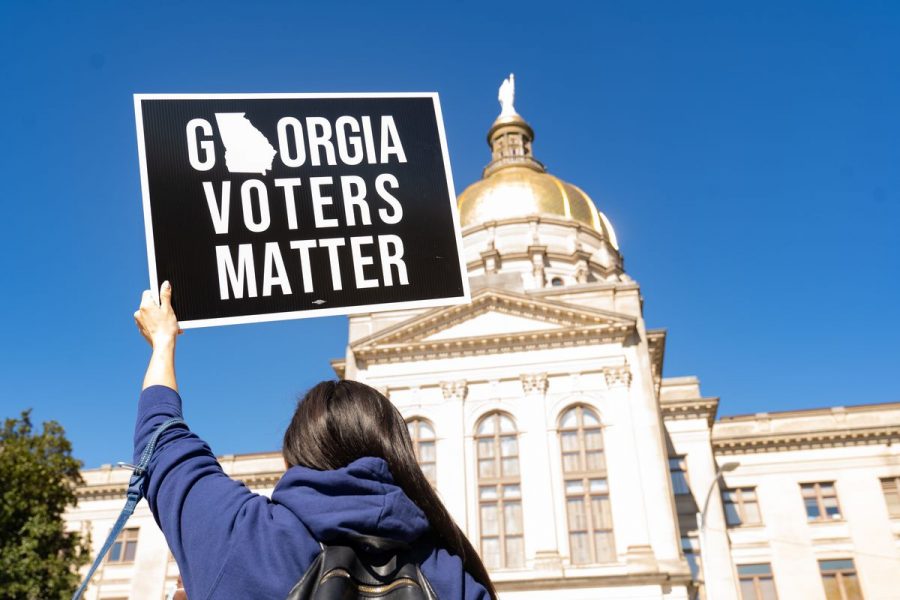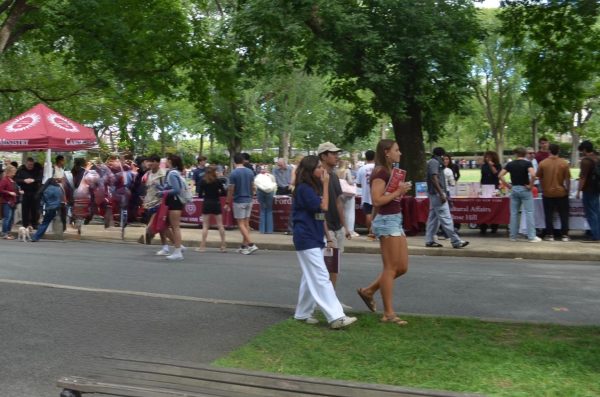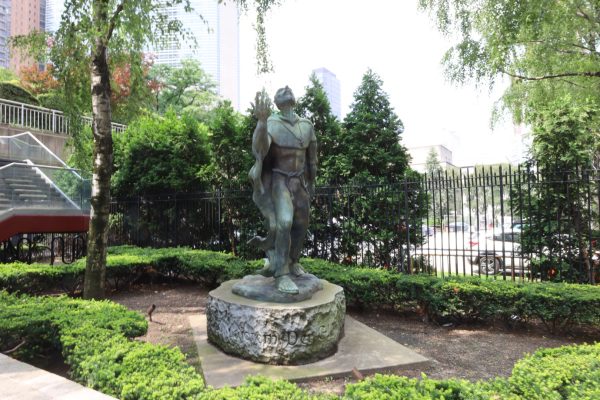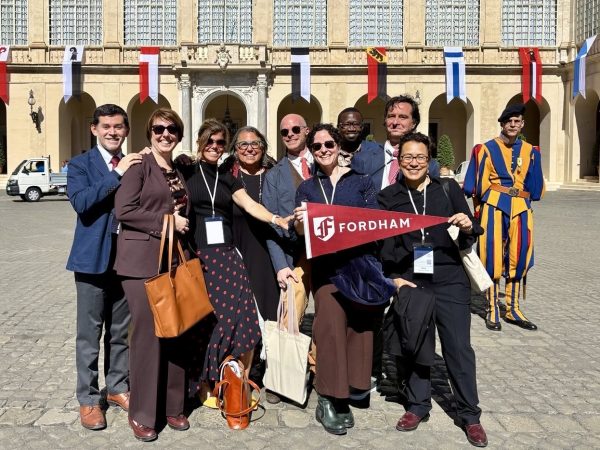Voter Suppression: A Fordham Perspective
Photo by Megan Varner of Getty Images
The restrictive new voting law passed in Georgia sparks national debate on voting rights. (Megan Varner/The Ram)
It’s a wrap on Will Smith’s latest movie. It hasn’t finished filming but the film’s crew, financed by Apple, has finished its work in Georgia. Apple is the latest of several corporations to leverage their economic power to protest the voting law recently passed in Georgia. The Election Integrity Bill of 2021 (SB 202), a 98-page piece of legislation, enacts many controversial changes that affect absentee voting, early voting, vote counting and the roles and responsibilities of local election offices across Georgia.
Following Georgia’s lead, Republicans in 42 other states are pushing to advance new voting legislation. Despite opposition from major Texas-based corporations, like American Airlines and Dell Technologies, Texas appears to be the next state to move towards passing new voting laws. While New York is not one of the states where lawmakers are attempting to enact restrictive voting laws, Fordham’s College Democrats are paying attention. The Fordham College Republicans did not respond to The Ram’s request for comment for this article.
The SB 202’s original proposal was drafted directly after the 2020 presidential election and “appears to be a panicked response to Georgia going blue,” said Caroline Chaplin, FCRH ’23, vice president of the College Democrats.
70% of Trump voters believe the 2020 presidential election was fraudulent based on Mr. Trump’s numerous allegations of voter fraud and about 60 lawsuits filed, according to Pew Research. Although no evidence was found and countless courts rejected the lawsuits, Republicans question whether President Biden could have rightfully received 13 million more votes than former President Obama, according to an analysis by Politifact. Georgia Secretary of State Brad Raffensperger has argued the new law will “restore confidence” in the election process.
After signing SB 202, Gov. Brian Kemp said in a speech that the law would “expand voting access in the Peach State” and “ensur[e] the integrity of the ballot box is not partisan.” In an interview with CNBC, Kemp continued to defend the new law, explaining it guarantees two mandatory Saturdays of early voting and that every county has at least one dropbox, which wasn’t the case before this bill was passed.
Some measures in the law may be “pretty innocuous,” said Borris Heersink, a professor in Fordham’s political science department.
However, Chaplin believes SB 202 represents an “attack on the functions of American democracy.” For example, criminalizing “line warming,” which involves volunteers giving food and water to voters waiting in line, only serves to reduce participation in elections, argued Timothy Koubek, FCRH ’21, president of the College Democrats. This measure only makes it more difficult for voters to wait in lines that can be hours long in Georgia, said Koubek. Page 44 of the bill explains the limitations to dropbox access, which Koubek argued is also “unnecessarily restrictive.”
“The majority of these new restrictions have the greatest effect on voters who vote majority Democrat, particularly voters of color,” said Chaplin.
Ken Frazier, the CEO of Merck, has also spoken out regarding restrictions affecting Fulton County, particularly about how they burden non-white communities. Drop boxes for absentee ballots are now limited in the county, which is 44% Black and includes most of Atlanta. While the bill allows Sunday voting, it is not mandatory and will be decided by local officials.
Church leaders, like Bishop Reginald T. Jackson of the Sixth Episcopal District of the African Methodist Episcopal Church, view the bill as an attempt to restrict the influence of Black churches on voter turnout. Local officials also have deciding power over access to mobile voting centers. However, Gov. Kemp stated that “portable and moveable facilities” will only be used in emergencies.
The bill “does not outright forbid or block voters from participating, although it does contain elements that make it harder to vote,” explained Heersink.
The State Board of Elections, appointed by the Georgia legislature, now has control over disqualifying ballots or assessing voters’ eligibility, said Heersink. Previously, local election offices held this responsibility. Partisan actors now have the power to determine the results of a close election for their party, explained Heersink. In Georgia, the legislature is majority Republican. Thus, Democrats are concerned that this responsibility may not be handled appropriately, which is concerning “from a ‘small-d’ democratic perspective,” said Heersink.
Koubek encouraged Fordham students to pay attention to the conversations happening in their state legislatures.
“See if your state is trying to restrict your vote,” said Koubek. “If so, call your state legislators, and tell them such bills are an affront to the democratic system.”
In response to Georgia’s new law and the looming threat of similar legislation in other states, Democrats in Congress are currently attempting to pass sweeping federal voting rights. H.R. 1, also known as the “For the People Act,” aims to enact automatic voter registration which means 15 days of early voting nationwide. The act also aims to end partisan gerrymandering and will require Super PACs to report their donors, explained Koubek. He argued H.R. 1 would “guarantee a fairer democracy, ensure that future elections continue to be free and fair and that the people’s wishes are represented.” The bill has already passed the House of Representatives and awaits a vote on the Senate floor.








































































































































































































